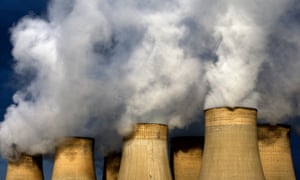
Labour Treasury sources said the party wanted to ensure that long-term impacts of climate change and environmental damage, including effects on food prices, flooding and loss of productivity in more frequent extreme weather, could have a direct impact informing economic policymaking.
Photograph: David Davies/PA
Labour vows to factor climate change risk into economic forecasts
Shadow chancellor John McDonnell to say ‘overwhelming challenge of climate change’ must be addressed from very centre of government
The risk posed by climate change would be factored into projections from the government’s independent economic forecaster if Labour took office, the shadow chancellor will announce on Tuesday.
John McDonnell will highlight the human and economic costs of manmade climate change, calling it the “greatest single public challenge” and say the government should include the fiscal risks posed by global warming in future forecasts.
The landmark change would, for the first time, put climate change on an equal footing with other complex challenges affecting the public finances such as demography.
Under a Labour government, the Office for Budget Responsibility would be given total independence, McDonnell will announce, saying the forecaster would report directly to parliament rather than the Treasury.
Speaking at the Institute for Public Policy Research on Tuesday, McDonnell will say that meeting the challenges of climate change will require “a transformation of our institutions and how our economies are run”.
McDonnell said that Labour “wants to ensure that the overwhelming challenge of climate change is addressed from the very centre of government. This includes the potential losses to the public finances.
“The public deserve to know what impacts we might expect on the national purse from the degradation of our environment. Sound, responsible economic management should already be accounting for this.”
Labour Treasury sources said the party wanted to ensure that long-term impacts of climate change and environmental damage, including effects on food prices, flooding and loss of productivity in more frequent extreme weather, could have a direct impact informing economic policymaking.
McDonnell will argue that the effects of manmade climate change are already having an economic effect. Costs in recent years have included more frequent flooding, which the Environment Agency estimates now costs £2.2bn annually.
Over the summer, the Bank of England said it had begun its own investigations into the extent of the banks’ exposure to the effects of climate change, announcing it was “initiating a review of climate-related risks in the UK banking sector”.
Several other authorities in Europe, including in Germany and Sweden, have also been examining the financial consequences of climate change. But the UK would be the first country in the world to mandate the assessment done by an independent fiscal council.
Under Labour, the OBR would be given additional resources to deliver the best economic modelling of environmental impact, McDonnell will say. “It will become a new centre of expertise for environmental macroeconomics,” he will say.
The shadow chancellor said he would “guarantee and reinforce that independence of the OBR by making the body report to parliament rather than the Treasury.
“We want the public, whether businesses or voters, to be absolutely confident that the public finances are properly scrutinised and managed.”
Environmentalists welcomed the proposal though cautioned that the effects of climate change could not all be given economic value.
Greenpeace UK’s chief scientist, Dr Doug Parr, said the change would “help concentrate the minds of future governments on the urgency and scale of the challenge” of climate change on the economy.
“Major companies and financial institutions have already started factoring in the impacts of climate change in their forecasts, so it’s right that the UK government should do the same for the public purse,” he said.
“Not all environmental degradation can be translated into monetary values, but if you just look at the billions of pounds of damage caused by floods, you can see why the impact of climate change on the government’s balance sheets cannot be ignored.”
Michael Jacobs, director of the IPPR commission on economic justice, said the change would be an important shift. “Over the last few years the Bank of England has been telling the financial sector that it must report on the investment risks arising from climate change,” he said.
“It is very welcome that Labour is now signalling that government – through the OBR – should do the same with its macroeconomic forecasts. This is an important way to ensure that climate change is properly integrated into economic policy.”
Friends of the Earth CEO Craig Bennett said the change would be “welcome news” and said the effects of climate change “could easily dwarf the huge financial crisis from which the world is still recovering.”
The WWF also backed the change and said other parties should follow. “All political parties need to ensure long-term planning for the environment is at the heart of their programmes,” Karen Ellis, WWF’s chief advisor on economics and development, said.










